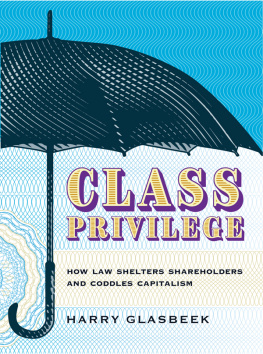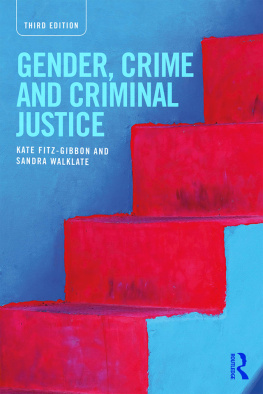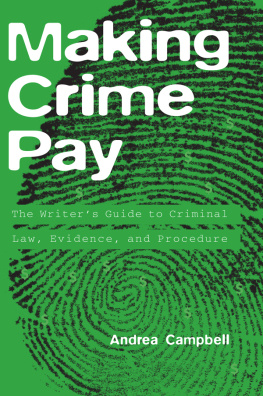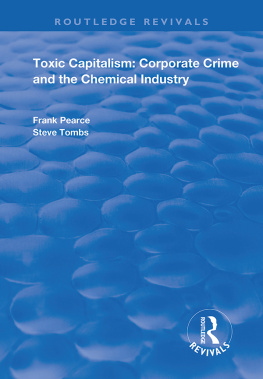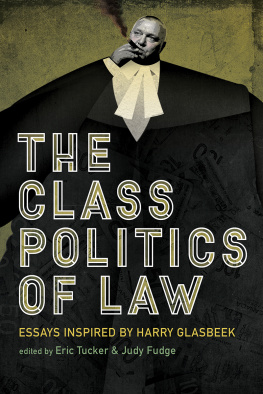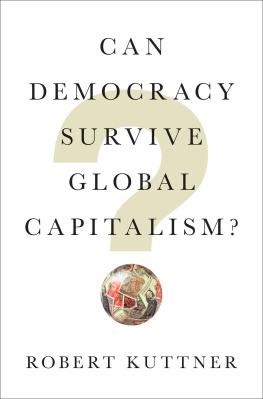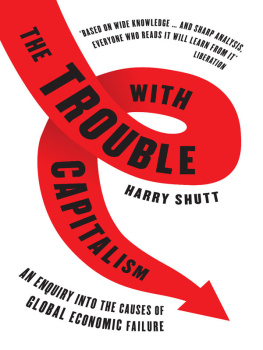Contents
Guide
Pages

CAPITALISM: A CRIME STORY
In this enthralling and eminently readable book, Harry Glasbeek explains how liberal law strives to reconcile capitalism with liberalism. Thanks to laws burnishing, capitalism acquires a liberal-hued patina of legitimacy. However, beneath the surface, cherished liberal principles are contorted or simply sacrificed for the sake of capitalisms ideological needs. In clear and powerful prose, Glasbeek offers us a piercing lens and a transformed language through which to see and to condemn capitalist power. This book is essential reading for those who wish to understand the world in order to change it.
Julian Sempill, senior lecturer, Faculty of Law, University of Melbourne and author of Power and the Law
Capitalism: A Crime Story contests the stories about law told by a wide gamut of capitalist fanatics, from corporate law professionals to legal academicsapologists who incredulously avert their eyes from the deceptive and deviant conduct of corporate capital. Glasbeek illustrates how laws tangled web shrouds the corporate form, masking the ways corporate capitalist coercion receives privileged treatment under law. Not satisfied to merely pierce the corporate veil, Glasbeek annihilates apologist narratives by rebuking the entrenched techniques of corporate profiteering and refuting the notion that capitalist business behaviour is distinct from the notion of a crime. Corporate capitalist wrongdoing is no mere aberration, it is the norm.
Adrian A. Smith, Department of Law & Legal Studies, Carleton University
Harry Glasbeek has done it again: another eloquent and accessible book for non-lawyers and lawyers alike, exposing capitalisms betrayal of basic liberal values and laws role as an accessory. From the Westray disaster to the devastation at Lac Mgantic, he shows how the lawlessness of corporations stands in sharp contrast to our expectations that individuals be both free of coercion and responsible for the harms caused by their actions. At this critical juncture we face the imminent loss of a habitable planet, yet Glasbeek shows a way forward to confronting the inherent criminality of capitalism.
Elizabeth Sheehy, professor of law, University of Ottawa
Glasbeek eloquently demonstrates that the theory and application of corporate law is antithetical to our norms and values of individual liberty and autonomy. By exposing the unequal power relationships prevailing under contemporary capitalism he challenges others to view the law as it is, and not as it has been sold to us.
Peter Grabosky, RegNet: Centre for Regulation and Global Governance, Australian National University
Harry Glasbeek outlines the bias that is built into our laws and regulatory regimes, which favour capitalism and render it legitimate. The lofty sounding rule of law and the status granted to lawyers and legal reasoning drives a belief system in which the logic of a layperson loses all credibility. Capitalism: A Crime Story provides readers with an analysis of the legal justifications used to replace moral and ethical values with the crimes of corporate capitalism.
Margaret Beare, professor of law and sociology, York University and author of Criminal Conspiracies: Organized Crime in Canada

Capitalism: A Crime Story
2018 Harry Glasbeek
First published in 2018 by
Between the Lines
401 Richmond Street West
Studio 281
Toronto, Ontario M5V 3A8
Canada
1-800-718-7201
www.btlbooks.com
All rights reserved. No part of this publication may be photocopied, reproduced, stored in a retrieval system, or transmitted in any form or by any means, electronic, mechanical, recording, or otherwise, without the written permission of Between the Lines, or (for photocopying in Canada only) Access Copyright, 56 Wellesley Street West, Suite 320, Toronto, Ontario, M5S 2S3.
Every reasonable effort has been made to identify copyright holders. Between the Lines would be pleased to have any errors or omissions brought to its attention.
L IBRARY AND A RCHIVES C ANADA C ATALOGUING IN P UBLICATION
Glasbeek, H. J., author
Capitalism : a crime story / Harry Glasbeek.
Includes index.
Issued in print and electronic formats.
ISBN 978-1-77113-346-3 (softcover).ISBN 978-1-77113-347-0 (EPUB).ISBN 978-1-77113-348-7 (PDF)
1. CorporationsCorrupt practices. 2. Corporate power. 3. Social responsibility of business. 4. Capitalism. 5. Corporation law. I. Title.
HV6768.G537 2018 | 364.168 | C2017-907080-0 |
C2017-907081-9 |
Text and cover design by David Vereschagin, Quadrat Communications
We acknowledge for their financial support of our publishing activities: the Government of Canada; the Canada Council for the Arts, which last year invested $153 million to bring the arts to Canadians throughout the country; and the Government of Ontario through the Ontario Arts Council, the Ontario Book Publishers Tax Credit program, and the Ontario Media Development Corporation.

It was the blind and insensate Greed. It was a monster devouring with a thousand mouths, trampling with a thousand hoofs; it was the Great Beastit was the spirit of Capitalism made flesh.
Upton Sinclair
Stupidity comes in many forms. Id like to say a few words on one particular form that I think may be the most troubling of all. We might call it institutional stupidity. Its a kind of stupidity thats entirely rational within the framework within which it operates but the framework itself ranges from grotesque to virtual insanity.
Noam Chomsky
A way to
fight back
What is remarkable and a little hurtful to me, a lawyer focused on corporate wrongdoing rather than the intricacies of corporate law and ordinary corporate practices, is that what I (and a relatively small number of like-minded academics) do is thought to be a non-serious thing to do. Real corporate law scholars and practitioners concentrate their efforts elsewhere. To them, the questions of legal personhood, of limited liability, of the relationships between the corporation and outsiders, of the relationships between the corporation and its board of directors, executives, shareholders, and creditors, are front and centre. They subject these issues to deep analysis to determine whether the existing legal regulation of the corporate world attains its objectives, namely, to create optimal conditions for capitalism, for the private accumulation of socially produced wealth. The private accumulation process is seen as unproblematic; indeed, it is portrayed as furthering the public good.
From this vantage point, students of corporate wrongdoing are perceived to be scholars looking for a niche, odd bods seeking to gain notoriety by setting themselves apart from mainstream scholars and policy-makers. The latter are preoccupied with the operations and machinations of an institution, the corporate firm, which plays a pivotal and positive role in our political economy. We, the others, are perceived by them as voyeurs looking for aberrant behaviours. At best, our preoccupation with the wayward is seen as dilettantish; at worst, as unwarranted and harmful. After all, as corporations interact with every aspect of our lives, it is inevitable that they will collide with the interests of others and that, on occasion, these collisions may involve wrongdoing. These predictable, if unwelcome, outcomes should not be given much weight when assessing the utility of the corporation. The conventional view is that corporate capitalists wrongdoing, undesirable as it might be, is abnormal. In this essay I want to confront that debate-stilling logic.


